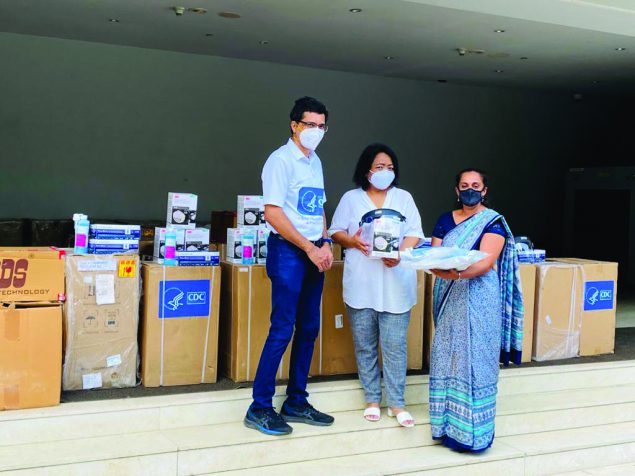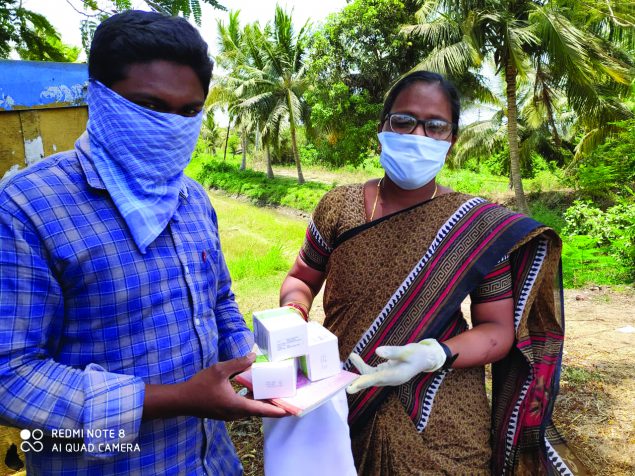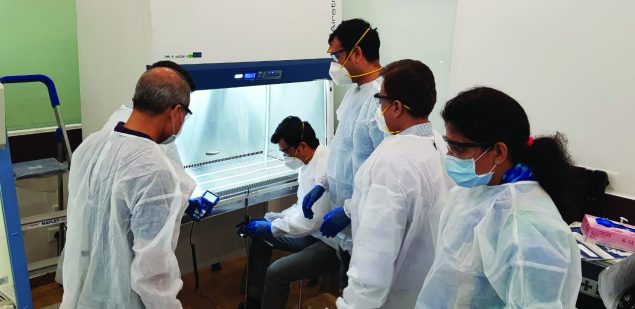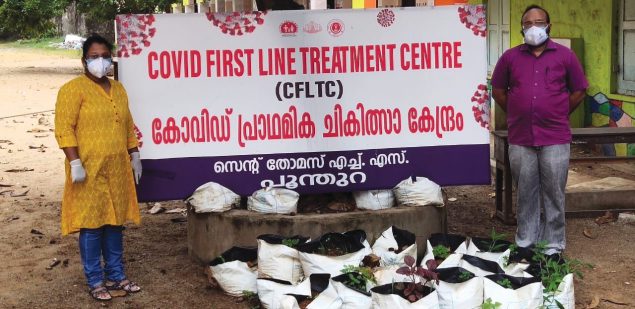COVID-19 Special Focus

CDC team distributes critical COVID-19 supplies to a Mizoram state official, 2021. Photo credit: CDC India office

Home delivery of anti-retroviral drugs by outreach worker in Rajahmundry, East Godavari district, Andhra Pradesh, 2020. Photo credit: CDC India office
At the time of this publication, although many challenges remain for the ongoing COVID-19 response in the United States and in India, both countries are supporting and learning from each other at a critical time. CDC’s decades of collaborations with GOI on global health security and other shared priorities have helped to build strong foundations for GOI’s ongoing response to the COVID-19 pandemic. Data, lessons learned, and innovative approaches developed in India are helping to inform CDC’s response in the United States and around the world.
India reported its first case of COVID-19 on January 30, 2020, the same day the WHO declared the novel virus outbreak a Public Health Emergency of International Concern. CDC India activated its incident management system soon thereafter to support both the U.S. Mission and the GOI with COVID-19 response efforts, helping to ensure effective management and timely deployment of CDC India staff. CDC India was reconfigured, and teams were formed to align with the most important areas of the response, including epidemiology and surveillance, emergency management, infection prevention and control, laboratory, clinical management, risk communication, and community mitigation.
CDC India has supported various aspects of COVID-19 outbreak response at the U.S. Embassy. CDC India efforts included infection prevention and control training, contact tracing for internal cases, and active participation in town halls with Embassy staff and the extended community across other consulates in India. In addition, CDC India supported development of return-to-work guidance, provided support for the American Embassy School, developed guidance for repatriation efforts involving over 7,000 American citizens across the country, and regularly provided situational reports to U.S. leadership and other sections. CDC India also provided critical support as part of an interagency team at the U.S. Embassy to provide U.S. Government monetary assistance in response to India’s second wave in the first half of 2021.

CDC laboratory team in collaboration with US Biothreat reduction program and NSF International, USA organized the second biosafety certification training in Gurugram, 2021. Photo credit: CDC India office

CDC supported EIS officers at COVID first-line treatment centre at Poonthura, Kerala, 2020. This site used to be a school before it was converted into a treatment centre during COVID-19 outbreak investigation, 2020. Photo credit: CDC India office
CDC India worked to support various aspects of the GOI’s response to COVID-19 in collaboration with the MOHFW, Ministry of Home Affairs, National Institute for Transforming India (NITI) Aayog, and various agencies of GOI. Some examples of CDC collaborations with GOI and other partners include:
Infection Prevention and Control (IPC):
CDC supported the development of COVID-19 IPC documents and related training activities used by GOI, academic partners, implementing partners, professional societies, and state health departments. Between March and August 2020, CDC supported COVID-19 hospital preparedness and IPC trainings that reached almost 14,000 people across 1,500 institutions in India and neighboring countries. The trainings were available in five languages: English, Telugu, Tamil, Hindi, and Malayalam.
Workforce Development:
CDC-supported Field Epidemiology Training Program (FETP) officers were deployed to assist local and state authorities in COVID-19 response activities, including 50 FETP officers and 73 alumni working in 22 states. FETP officers have supported local/state public health authorities with the COVID-19 response in activities including data analysis and surveillance system strengthening; COVID-19 cluster outbreak investigations in community, residential, marketplace, assisted living, healthcare settings, university, and school settings; epidemiological studies; development of infection control assessment tools for healthcare facility and school settings; and infection mitigation surveys in a mass gathering event.
Laboratory Systems:
CDC India provided technical guidance and training on safe COVID-19 sample collection, testing, and transport to over 10,000 healthcare workers across 210 districts in the country. These efforts included frontline workers of the National Disaster Response Force and research scientists involved with COVID-19 biorepositories in GOI’s Department of Biotechnology.
Emergency Management:
CDC India trained thousands of postgraduate medical students and first-line responders on public health emergency management. CDC also supported training of Public Health Emergency Management fellows at CDC Headquarters in Atlanta. Currently, alumni of these programs are either leading or supporting GOI COVID-19 response efforts in various capacities.
CDC participates in the GOI Emergency Operations Center (EOC) Expert Committee, which was established to oversee development of the country’s Public Health Emergency Operations Centers (PHEOC). The technical assistance includes expansion of PHEOC capacity (national and subnational) through development of plans, guidelines, and processes, and through provision of a training package for EOC staff. CDC India is working at the subnational level to support GOI’s Community Emergency Response Teams on COVID-19 response efforts and recently worked with GOI to develop a self-learning training package for Rapid Response Teams available on GOI and WHO websites.
Research Studies:
CDC experts worked with Indian scientists to use existing research platforms for COVID-19 and developed protocols to conduct studies to inform evidence-based public health decision-making. Current research collaborations focus on transmission and burden of COVID-19 in India.
Regional Support:
CDC India provides regional support to countries in south and southeast Asia through direct bilateral engagements with partner countries in the region and through WHO’s South- East Asia Regional Office. CDC India’s support for countries in the region ranges from sharing updated public health guidance, to providing technical assistance on surveillance, clinical management, infection prevention and control, and laboratory testing. CDC India supports targeted training through bilateral and regional virtual meetings and webinars. CDC India has also provided laboratory equipment to Bhutan and has facilitated shipment of testing kits from CDC’s International Reagent Resource to Bhutan, Nepal, Sri Lanka and Maldives.